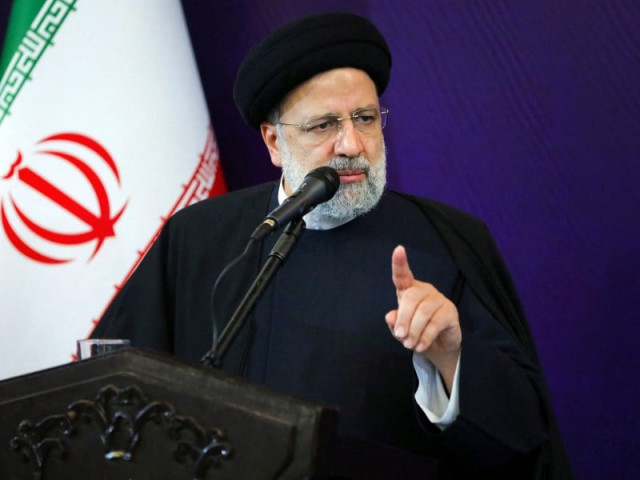Iranian president’s visit on track despite regional tensions
Fate of the visit was hanging in balance after Israel reportedly launched attack on Iran on Friday morning

Despite simmering tensions in the region, the visit of the Iranian President is on track and there is no change in the schedule, officials familiar with the development said on Friday.
Iranian President Ebrahim Raisi is scheduled to undertake an official visit to Pakistan starting on April 22. He will also travel to Lahore and Karachi during his three-day trip.
The fate of the visit was hanging in the balance after Israel reportedly launched an attack on Iran on Friday morning. Tehran denied any damage while Tel Aviv kept mum over the reported attacks.
Observers believe that the apparent Israel attack was symbolic and perhaps carried out with a lot of care to avoid any reaction from Iran.
Read more: Iran president Raisi to visit Pakistan on 22nd
Against this backdrop, Pakistani authorities were cautiously monitoring the unfolding situation as any deterioration might persuade the Iranian president to postpone his upcoming visit to Pakistan.
However, officials said that both sides were in touch with each other and Raisi’s visit is going ahead as planned.
Speaking at the weekly briefing, Foreign Office Spokesperson Mumtaz Zahra Baloch said that Pakistan was looking forward to welcoming the Iranian president.
“As I have said earlier, Pakistan is looking forward to receive our honoured guest, His Excellency, the President of the Islamic Republic of Iran, and we will be making an official announcement regarding the dates of the visit soon,” she added.
The visit comes against the backdrop of an unprecedented border standoff between Pakistan and Iran in January. The crisis was triggered by Iranian missile strikes inside Pakistani territory.
Shocked by the Iranian move, Pakistan had to recall its ambassador from Tehran and conduct retaliatory strikes inside Iran two days later.
Also read: Zardari, Raisi for more info exchanges on security
The situation, however, quickly was brought under control after the two countries established high-level contacts. Iranian Foreign Minister Hossein Amir-Abdollahian travelled to Islamabad within days of the missile exchanges.
The two countries agreed to restore diplomatic relations and decided to implement a series of measures to avoid future escalations.
As part of the confidence-building measures, Iran conveyed to Pakistan that its president would visit Islamabad after the February 8 elections.
With the Iran-Israel tussle and deepening Middle East crisis, the upcoming visit of the Iranian president will be followed closely by the outside world.
The US and other Western countries are seeking greater sanctions against Iran and discussing new measures to isolate Iran.
Observers believe that it is a test case for Pakistan to host the Iranian president at a time when the US and its allies are looking to corner Tehran.
The two sides during the visit of the Iranian president would discuss the January missile exchanges and measures to avoid such incidents in the future.
In order to boost bilateral cooperation, the two countries are expected to make a move on the long-delayed Iran-Pakistan gas pipeline.
The Pakistani government recently approved the laying of a gas pipeline on its side of the border in a move that raised many eyebrows in the US.
The project was supposed to be completed in December 2014 but fear of US economic sanctions discouraged Pakistan from going ahead with the multibillion-dollar project.
However, Pakistan feared a possible penalty from Iran and in order to avoid that scenario it decided to build an 80-kilometre patch from Gwadar to the Iranian border.
The US has always objected to the project and made its intention clear after the latest push by Pakistan to import gas from Iran through a pipeline.
Pakistani authorities, however, insisted that the country is laying a pipeline on its territory. The question of importing gas would come when the pipeline is connected to the Iranian network.
The process of construction could take time and Pakistan would assess the situation accordingly, according to officials.
Meanwhile, the spokesperson said that Pakistan had seen the media reports about the reported Israeli attack and was still assessing the situation. “We would comment when there are more details. Pakistan is naturally concerned over any escalation in the region,” she added.
She said that for months, Pakistan had underlined the urgency of international efforts to prevent the expansion of hostilities in the region and for a ceasefire in Gaza.
“Instead of showing restraint and upholding international law. Israel has brazenly continued with its blatant violation of international law. The irresponsible and reckless Israeli attack on the Iranian consulate on the first of April has further vitiated security in an already volatile region.”
“We reiterate our call on the UN Security Council to prevent Israel from its adventurism in the region and to hold it to account for its violations of international law. The council should actively contribute to efforts for restoring and maintaining international peace and security,” she added.



















COMMENTS
Comments are moderated and generally will be posted if they are on-topic and not abusive.
For more information, please see our Comments FAQ